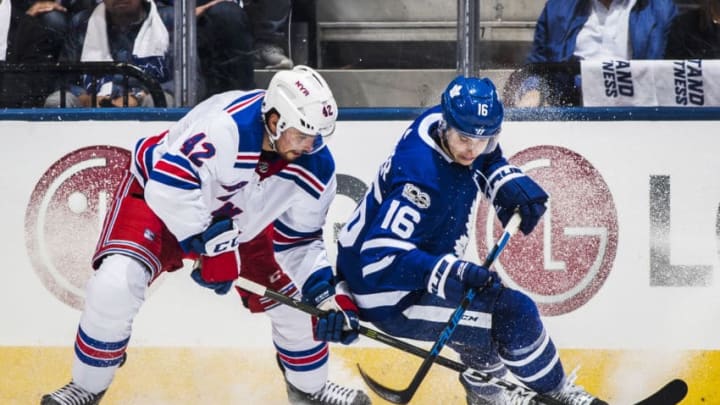The Toronto Maple Leafs are faced with the impending task of signing Matthews, Marner and Nylander longterm.
Ever since it became clear that the Toronto Maple Leafs had three potential superstars in their lineup, fans and sites like this have had a ton of fun speculating what it will cost to sign them, not just in terms of salary, but also in opportunity cost.
Some have argued that the Leafs should trade from a position of strength for someone who plays defense. Myself, I’ve always said they should keep all three at all costs. You don’t know how good any defenseman you’re getting back for Nylander will be , but you do know how good Nylander is.
It is almost always better to keep the sure thing than to take a chance on potential. The way to build the franchise from here on out is to sign the three main players and then maximize the quantity of draft picks you make each year in an effort to be able to keep pumping out players that can contribute in the NHL on the entry-level contracts.
Contract Myth
The Contract Myth that surrounds the Leafs is that the team might be better off in the long run that Nylander and Marner have struggled and that Auston Matthews has been injured, because it will help suppress the price that they’ll get on their contracts.
More from Editor In Leaf
- Toronto Maple Leafs: Nick Robertson Healthy and Ready
- Ryan Reaves Will Have Zero Impact on Toronto Maple Leafs
- Toronto Maple Leafs: Playing Max Domi In Top-Six a HUGE Mistake
- Top 10 Scandals in the History of the Toronto Maple Leafs
- Toronto Maple Leafs: Results from the Traverse City Prospects Tournament
Furthermore, a sometimes even crazier argument occasionally follows that: that the Leafs are intentionally setting their lines in such a way as to help suppress the statistics of said players.
This can easily be debunked by assuming that people capable of getting the job of running the Toronto Maple Leafs have basic risk/reward calculation abilities. Where the Leafs to do this, they’d run the risk of discrediting the entire organization, alienating fans, risk being punished by the Players Association in some kind of law suit, and everyone involved would lose their jobs. Oh and the players would definitely quit on the organization.
That is the risk. The reward is that the team might save a couple of million? Give me a break.
Slumps Don’t Matter
As for sophomore slumps and injuries suppressing prices, if you think about that, it’s almost equally absurd. The bridge contract is all but extinct. Teams now routinely sign players they think will become stars to long term contracts when they are coming off their entry-level deals. For the most part, these seven and eight year deals cover the majority of the player’s prime. In the past, if you waited until the player was 25 and coming off a bridge deal, you’ve already paid them for three years of their prime (as well as, most likely, their peak season) and the new eight year deal will now feature two or more seasons of decline.
The thinking is that if you pay for potential, you get good value on your dollar. If you wait and pay for past performance, you don’t get that value. So teams project where the player is headed and if they like him, they’ll now pay him for his potential. Unless you guess wrong and the player never ends up earning the money, this is a pretty team friendly practice, especially when dealing with a McDavid or a Matthews.
So based on the fact that the Leafs, the players, and their agents, all know that the Toronto Maple Leafs will be paying these guys on potential and not accomplishments, it’s logical to assume that a ten point swing one way or the other, in terms of this season’s point totals, is going to have very little affect on the proceedings.
Next: Zaitsev's Absence Hurting Leafs
Matthews, Marner and Nylander are not going to save the Toronto Maple Leafs any money by having sub-par years this year. The Leafs sure as hell are not engaged in a price fixing conspiracy. Those guys are getting paid.
Thanks for reading
